The Garden Helper's Plant of the Day ArchiveThe Plants of the Day for April 2011Below you will find an index of all the plants, flowers and trees that have been profiled as aPlant of the Day at The Garden Helper and at The Gardener's Forum |
More Plants and FlowersOctober 2010November 2010 January 2011 February 2011 March 2011 May 2011 June 2011 July 2011 August 2011 The Plant of the Week 2011 The Plant of the Week 2012 |
April 1, 2011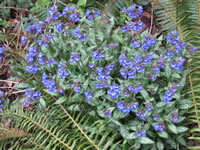 Spotted Lungwort Pulmonaria officinalis Spotted Lungwort is a clumping, evergreen perennial that is known for its pretty, marbled or spotted foliage and brilliantly colored spikes of nodding, blue flowers that fade to pink or pure white flowers that appear in early spring and last for several weeks. Hardy in USDA zones 6-9 |
April 2, 2011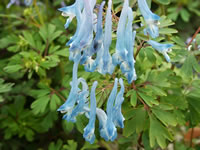 Blue Corydalis Corydalis flexuosa Blue Corydalis is a slow growing, evergreen perennial that will eventually form a dense 18" clump of elegant, 12" tall, lace-like green foliage. Eighteen inch spikes of dangling, tubular, sky blue flowers will adorn the plant from late spring until fall in regions with cool summers. Hardy in USDA zones 5-9 |
April 3, 2011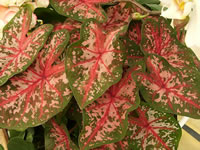 Caladium Colocasia esculenta The Caladium is a frost tender, perennial tuber which is grown for its colorful foliage rather than flowers. The leaves are usually a combination of different shades of red, pink, green, white. They are easy to grow plants, but tend to be fussy about growing conditions. Hardy in USDA zones 10-11 |
April 4, 2011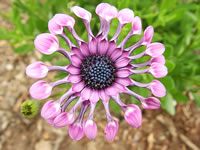 African Daisy Osteospermum barberae The blooming season of the African Daisy plant begins in early spring and continues until the first frosts of fall. The flowers of the African Daisy will only open fully on a sunny day, but even on an overcast day, they will open partially, giving you a much different effect. Annual Plant |
|
|
||||
April 5, 2011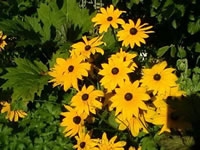 Black Eyed Susan Rudbeckia hirta Black Eyed Susan's bright yellow, daisy-like flower grows to a height of 24-36 inches and are excellent to use in cut flower arrangements and for growing in your butterfly garden.The Black Eyed Susan is typically an annual wildflower, but some types are perennials that are Hardy in USDA zones 3-10 |
April 6, 2011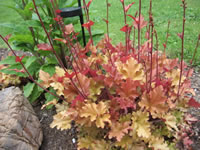 Coral Bells Heuchera sanguinea Coral Bells are compact growing, 18" mounding, evergreen plants that offer a growing variety of outstanding foliage colors in shades of purple, rose, lime green, gold as well as many striking variegations. Heucheras attract Butterflies and Hummingbirds, and are Deer resistant plants. Hardy in USDA zones 6-9 |
April 7, 2011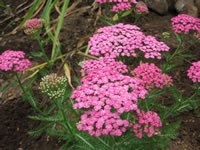 Achillea 'Pink Grapefruit' Achillea millefolium Yarrow belongs to a group of plants that includes many perennial, drought resistant plants that will grow in almost any garden soil. The bright, colorful Achillea flowers attract many types of butterflies, but they may become an invasive weed if they are not properly controlled. Hardy in USDA zones 3-10 |
April 8, 2011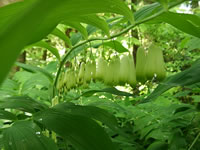 Solomon's Seal Polygonatum multiflorum The Solomon's Seal is a shade loving, deciduous perennial that produces large, slow spreading clumps of arching, three feet stems lined with pairs of bright green leaves. In late spring, clusters of 2-5 elongated bell shaped, greenish-white flowers will hang beneath each pair of leaves. Hardy in USDA zones 5-9 |
April 9, 2011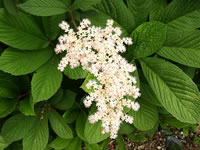 Fingerleaf Rodgersia Rodgersia aesculifolia The Fingerleaf Rodgersia is a large, imposing, moisture loving plant that will stand out, no matter where you plant it in your garden. Rodgersias produce their long lasting, fluffy plumes of tiny, star shaped, light pink or white flowers beginning in late spring and continuing until mid summer. Hardy in USDA zones 5-9 |
|
|
||||
April 10, 2011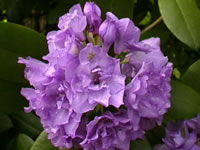 Rh. 'Fastuosum Flore Pleno' Hardy in USDA zone 5-8. Deep lavender, double flowers appear in trusses of 8-15 blooms in early to mid May. Grows to 15' tall x 10' wide. Rhododendron Care Pruning Rhododendrons Transplanting Rhododendrons |
April 11, 2011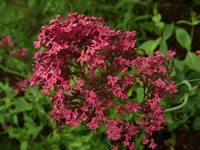 Jupiter's Beard Centranthus ruber The Jupiter's Beard is a highly adaptable, low maintenance plant that is able to grow in most conditions except for in moist shaded areas. This drought tolerant, 2-3 ft. branching perennial produces dense clusters of tiny, fragrant, star shaped flowers Hardy in USDA zones 4-9 |
April 12, 2011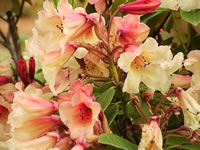 Rhododendron 'Unique' Hardy in USDA zone 6-9. Bright pink buds open to pale yellow flowers that fade to cream appear in trusses of 11-15 blooms in late April to early May. Grows to 4' tall x 4' wide. Rhododendron Care Pruning Rhododendrons Transplanting Rhododendrons |
April 13, 2011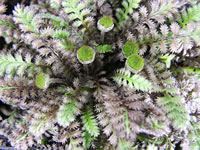 New Zealand Brass Buttons Leptinella squalida The interesting feathery, fern like foliage of the New Zealand Brass Buttons may give the impression that it is a delicate plant, but in reality it is a tough enough ground cover that it can take light foot traffic and is even used as a lawn substitute in many areas. Hardy in USDA zones 5-9 |
April 14, 2011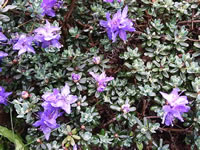 Rhododendron impeditum Hardy in USDA zones 5-9. Low growing, mounding dwarf Rhododendron with small, dark green, aromatic leaves. Bright purple, 1" double flowers appear in mid spring. Bronze Winter foliage Grows to 1' tall x 2' wide. Rhododendron Care Pruning Rhododendrons Transplanting Rhododendrons |
April 15, 2011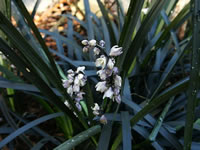 Black Mondo Grass Ophiopogon planiscapus Black Mondo Grass grows as neat, slowly spreading, 4" tufts of ¼" wide, sweetly fragrant, straplike leaves. New foliage emerges dark green in spring then changes to dark purplish-black by summer. Black Mondo grows to about 10" tall, and will slowly spread to about two feet. Hardy in USDA zones 6-10 |
April 16, 2011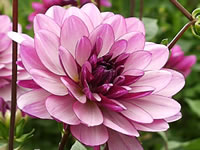 Dahlia 'Lauren Michelle' Dahlia hybrida With a blast of different colors, shapes and sizes, Dahlias bring life and beauty back to your landscape in late summer and into the fall months. The diversity of the Dahlia allow you to use them in many different aspects of your landscape design Dahlias Gallery Hardy in USDA zones 7-11 |
April 17, 2011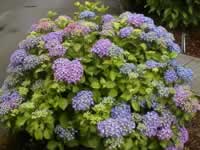 Hydrangea macrophylla
Hydrangea macrophyllaNatures own pH tester... In acid soil (<pH 7.0) the blooms will be blue, pink flowers if your soil is alkaline soil (>pH 7.0), and white blooms in neutral pH soil. Hydrangea macrophylla plants only bloom on the tips of new growth, so you can remove any stems that have already flowered. Hardy in USDA zones 8-11 |
April 18, 2011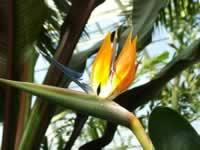 Bird of Paradise Strelitzia reginae The Bird of Paradise plant grows best when it receives a minimum of four hours of direct sunlight a day, but they should have bright light all day. Strelitzia flower more readily when they are somewhat rootbound, which is why they are often grown in large pots or tubs. Hardy in USDA zones 9-12 |
April 19, 2011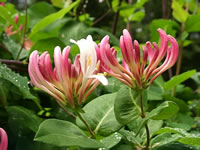 Goldflame Honeysuckle Lonicera heckrottii Honeysuckle vines are easy to grow, vigorous, heat-tolerant, and nearly indestructible. The flashy and fragrant flowers will attract hummingbirds and butterflies all summer long. The resulting fruit of the Honeysuckle flower will provide a fall treat for your local songbirds as well. Hardy in USDA zones 5-9 |
April 20, 2011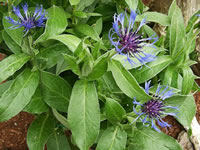 Mountain Cornflower Centaurea montana The Mountain Cornflower is an easy to grow, upright perennial which forms large clumps which typically reach three feet tall. They begin producing their bright blue, two inch flowers in late spring and will often continue blooming well into fall. Hardy in zones 3-9 |
April 21, 2011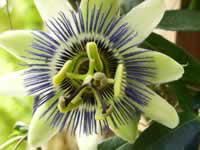 Passion Flower Passiflora incarnata The Maypop derived this early common name from the way it just seems to 'pop' out of the ground. They were renamed as the Passion Flower by missionaries in the early 1500s. They begin blooming in July and continue until frost. The vines can easily grow up to 15 feet. Hardy in zones 5-9 |
April 22, 2011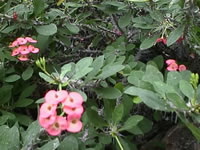 Crown of Thorns Euphorbia milii The Crown of Thorns is a frost tender, multi-stemmed, succulent shrub that originated in Madagascar. Dark green, tear shaped leaves appear randomly on each thorn covered branch. A Crown of Thorns will produce flowers nearly all year, but especially in the winter. Hardy in zones 10-12 |
April 23, 2011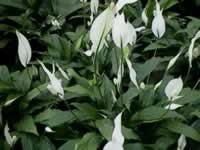 Peace Lily Spathiphyllum floribundum Peace Lily Plants prefer bright filtered light, but will survive in low interior light. They should be kept in a warm environment (68°-85° daytime temperature) with a 10 degree night time drop. Most tropical house plants should be re-potted every 2-3 years. Hardy in zones 10-11 |
April 24, 2011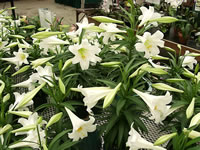 Easter Lily Lilium longiflorum Over 12 million Easter Lilies were grown and sold in North America this year. While growing inside the home they are a source of beauty and fragrance. Never place your lily in a draft or where it will be exposed to heat or dry air from appliances, fireplaces or heating ducts. Hardy in USDA zones 6-11 |
April 25, 2011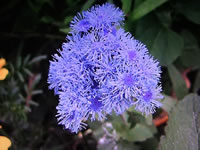 Floss Flower Ageratum houstonianum The Floss Flower is an annual plant that is native to Mexico. They are great plants for containers or for mass plantings in your flower beds, or as border plants. Best known for their furry mounds of long lasting red, white or blue flowers. Regular deep watering is essential. Annual Plant |
April 26, 2011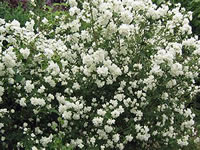 Mock Orange Philadelphus virginalis Mock Orange Trees thrive in full sun or light shade. They will grow in almost any soil, but grow best in moist, well drained soil that has been supplemented with peat moss, leaf mold or compost. Mock Orange needs to be pruned immediately after flowering. Hardy in USDA zones 2-9 |
April 27, 2011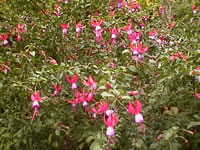 Fuchsia arborescens Fuchsia care is determined by your climate, but in most cases they can be treated in the same way you'd treat any other shade loving perennial. Fuchsias can be upright growing shrubs or trailing plants growing in hanging baskets. Unfortunately, most Fuchsias are only hardy to USDA zones 9-10, but many upright species are hardy in zone 7. |
April 28, 2011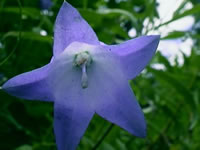 Bellflowers Campanula sp. There are about three hundred different species of Campanula. The family contains annuals, biennials and perennials, most of which produce bell shaped flowers in shades of blue, purple, pink or white. The plants themselves range from low growing miniatures and creepers to six foot uprights! Hardiness zones vary |
April 29, 2011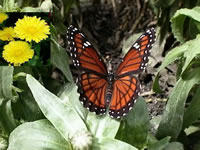 English Marigold Calendula officinalis English Marigolds are bright, cheery, easy to grow annual plants that bloom from early summer, up until the first frost, producing large, showy, flowers in shades and blends of yellow, orange, apricot and cream. Herbal use of Calendulas Annual Plant |
April 30, 2011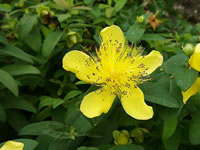 St. John's Wort Hypericum calycinum St. John's Wort produces long lasting, bright yellow flowers with prominent gold stamens from mid summer until mid fall. Once established, these deer resistant and durable plants can tolerate neglect, drought, and poor soils. Herbal and Medicinal Uses Hardiness Zones vary |
More Plants and FlowersOctober 2010November 2010 January 2011 February 2011 March 2011 May 2011 June 2011 July 2011 |
|||
Search The Garden Helper: